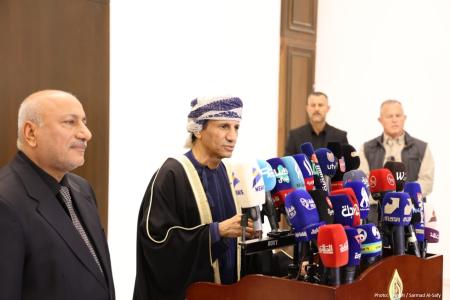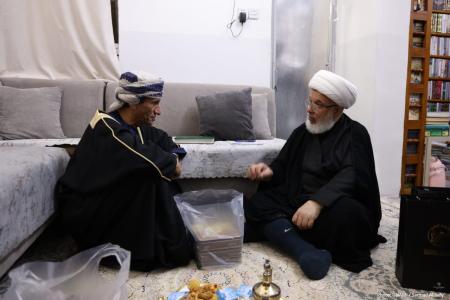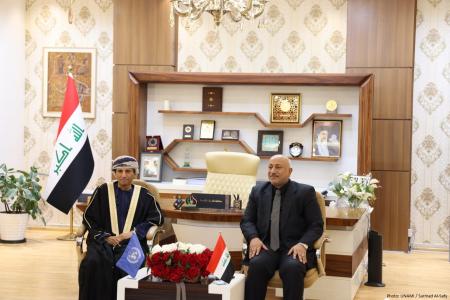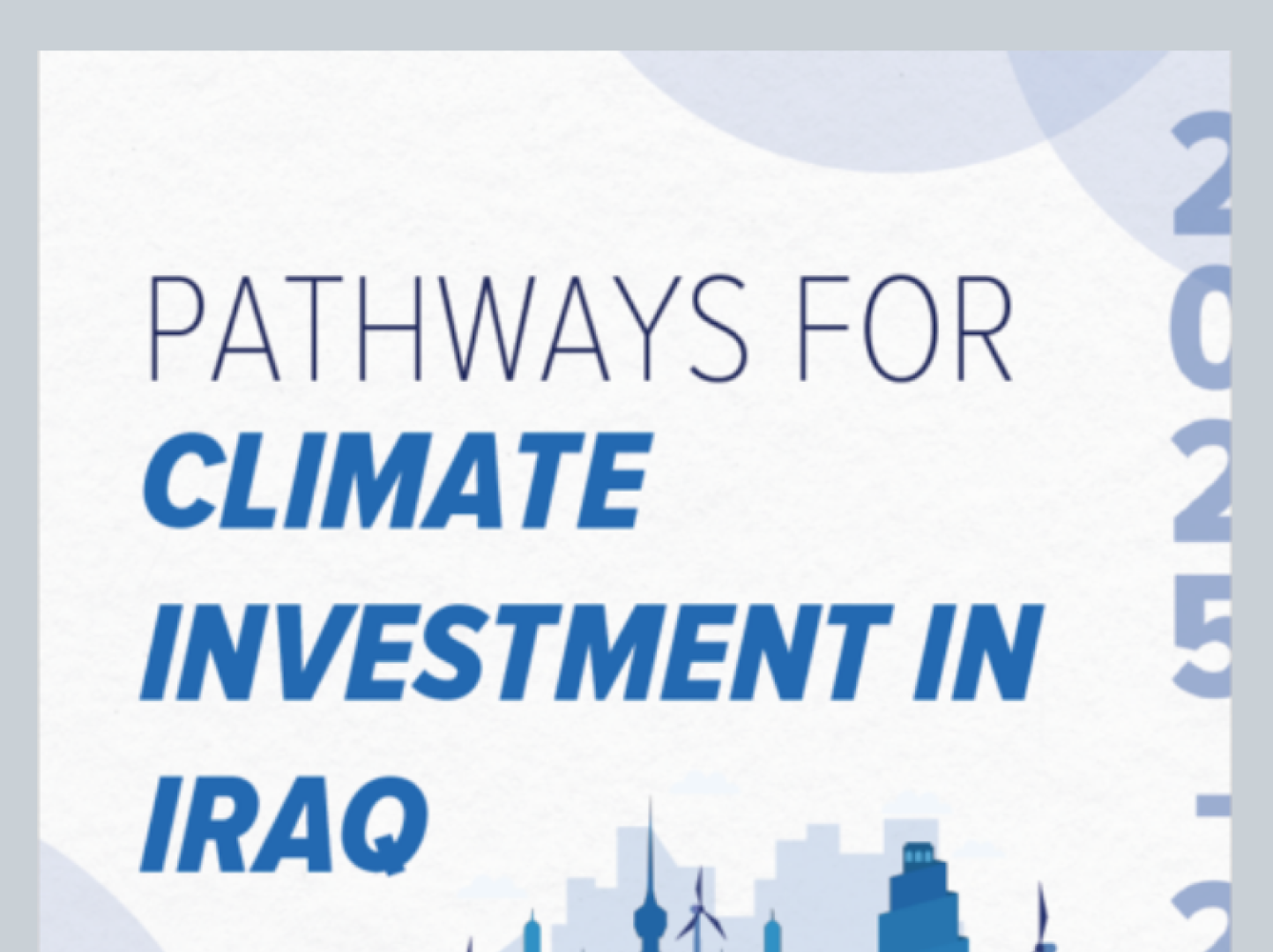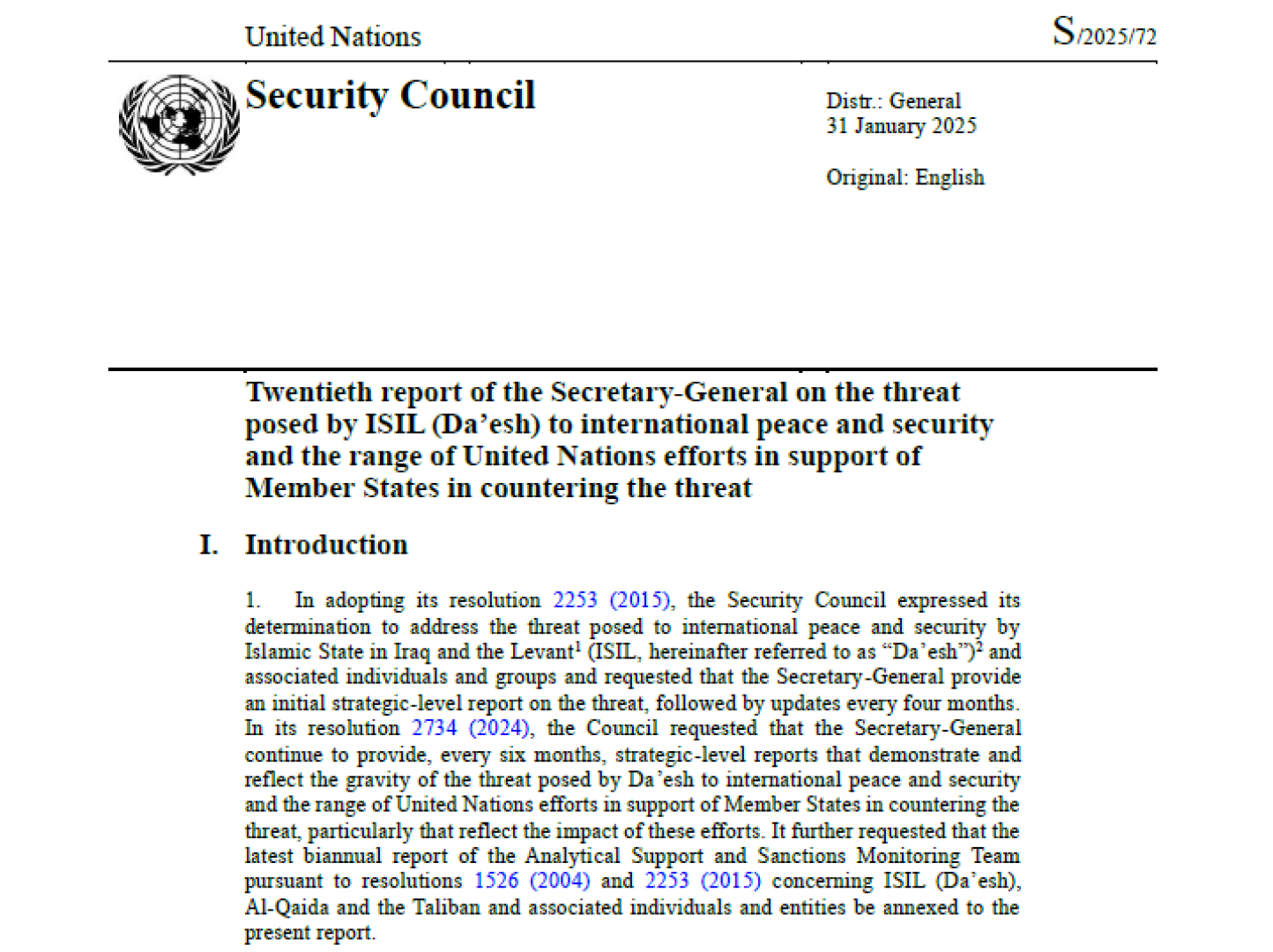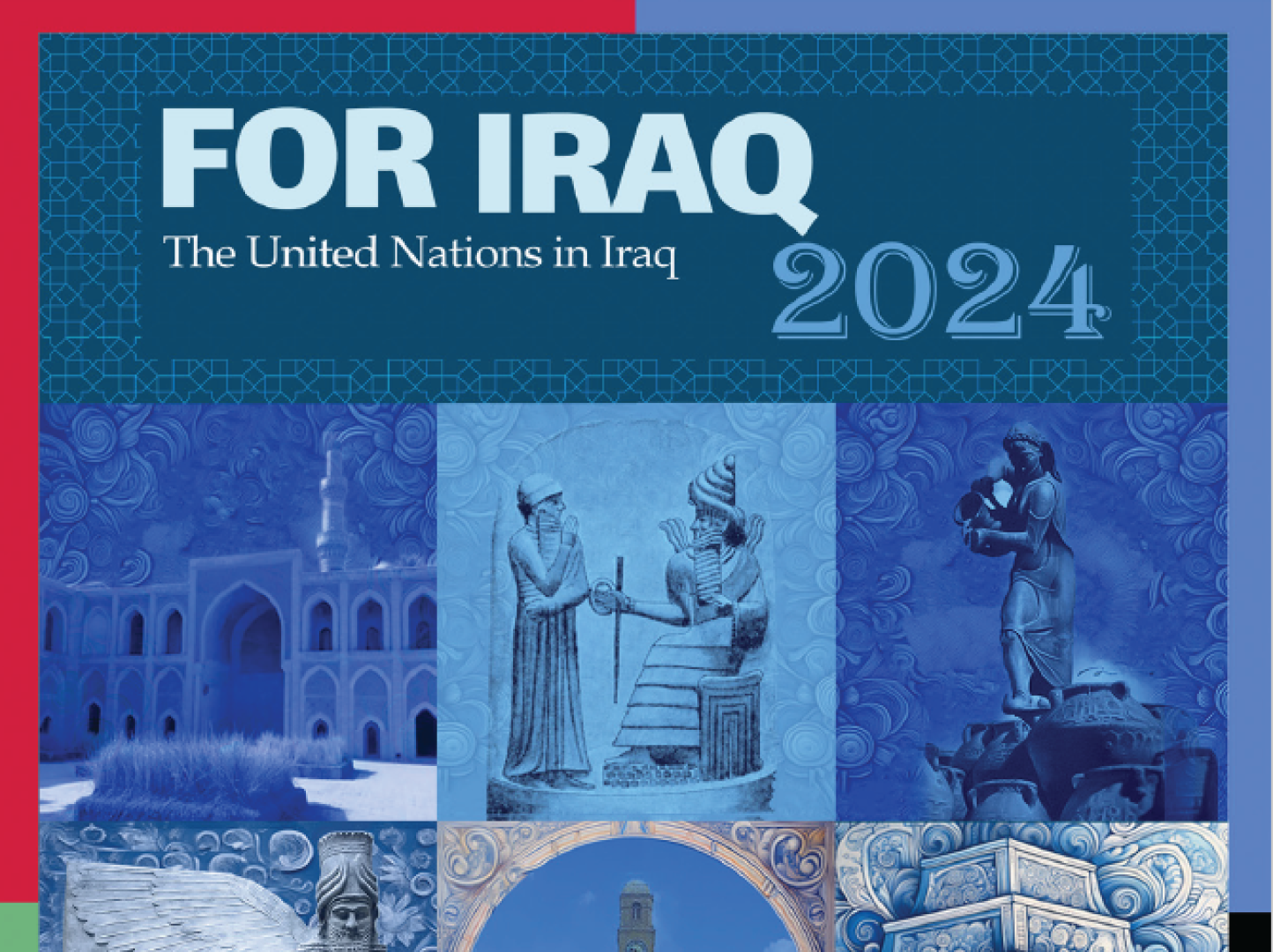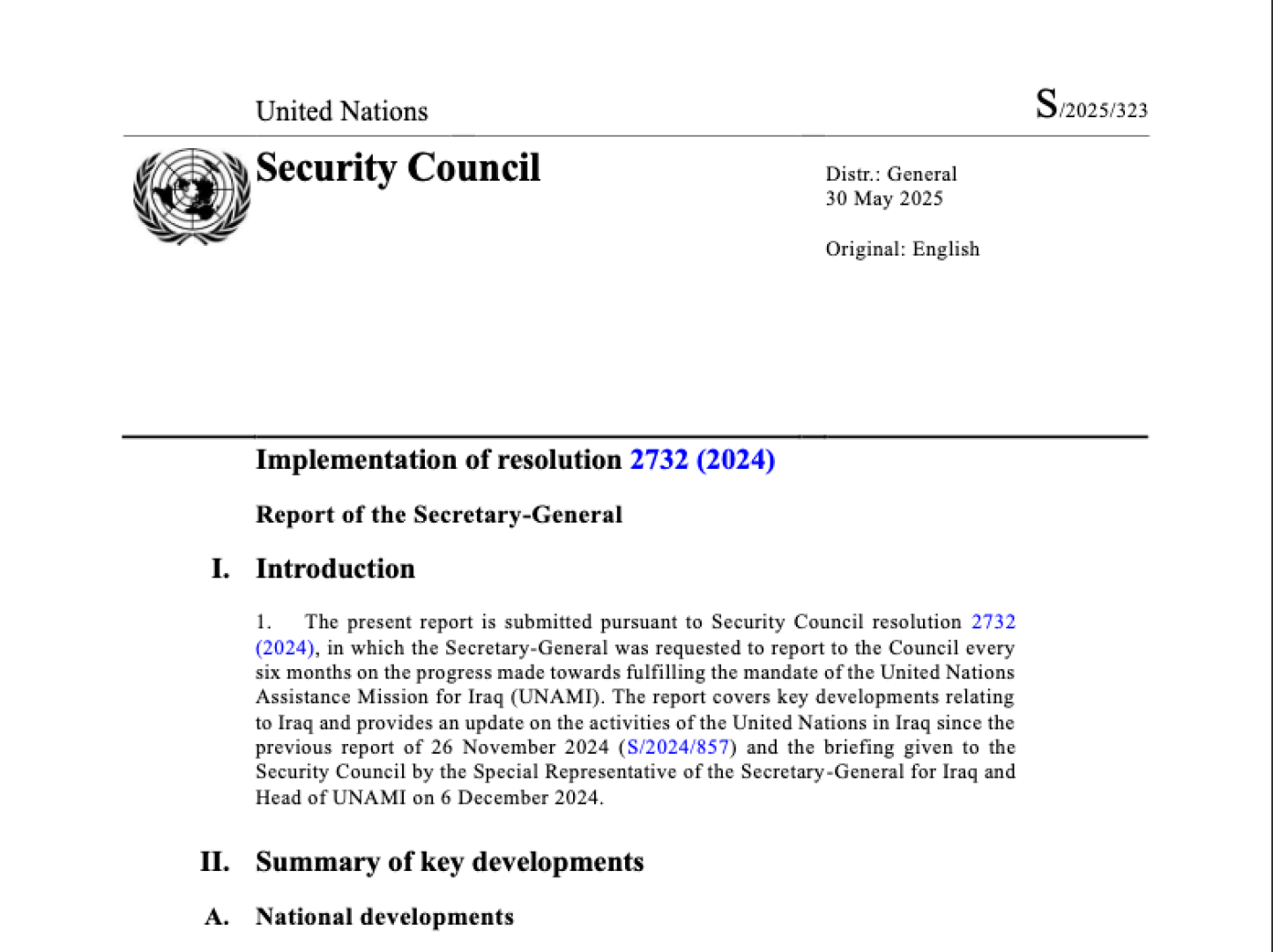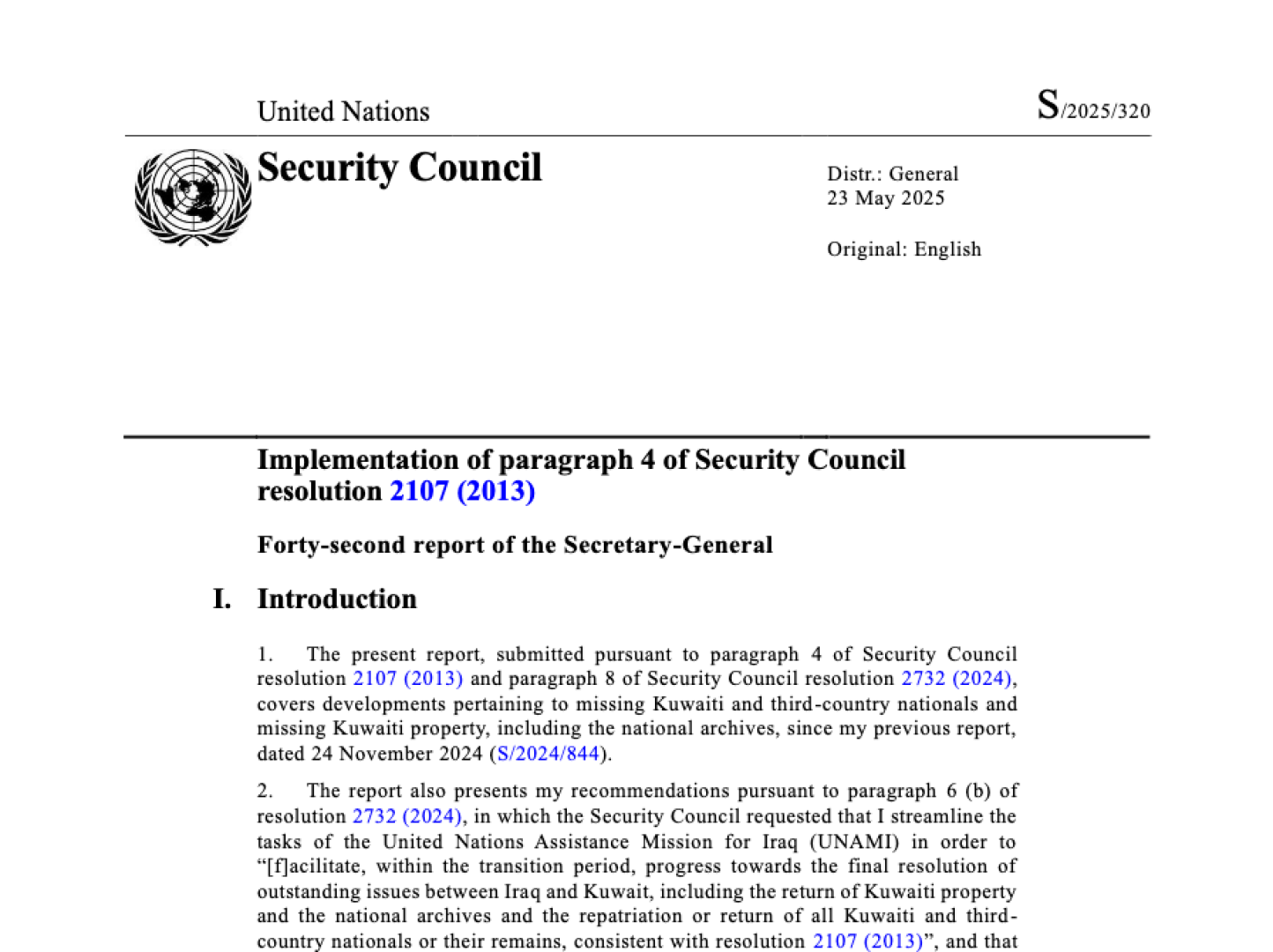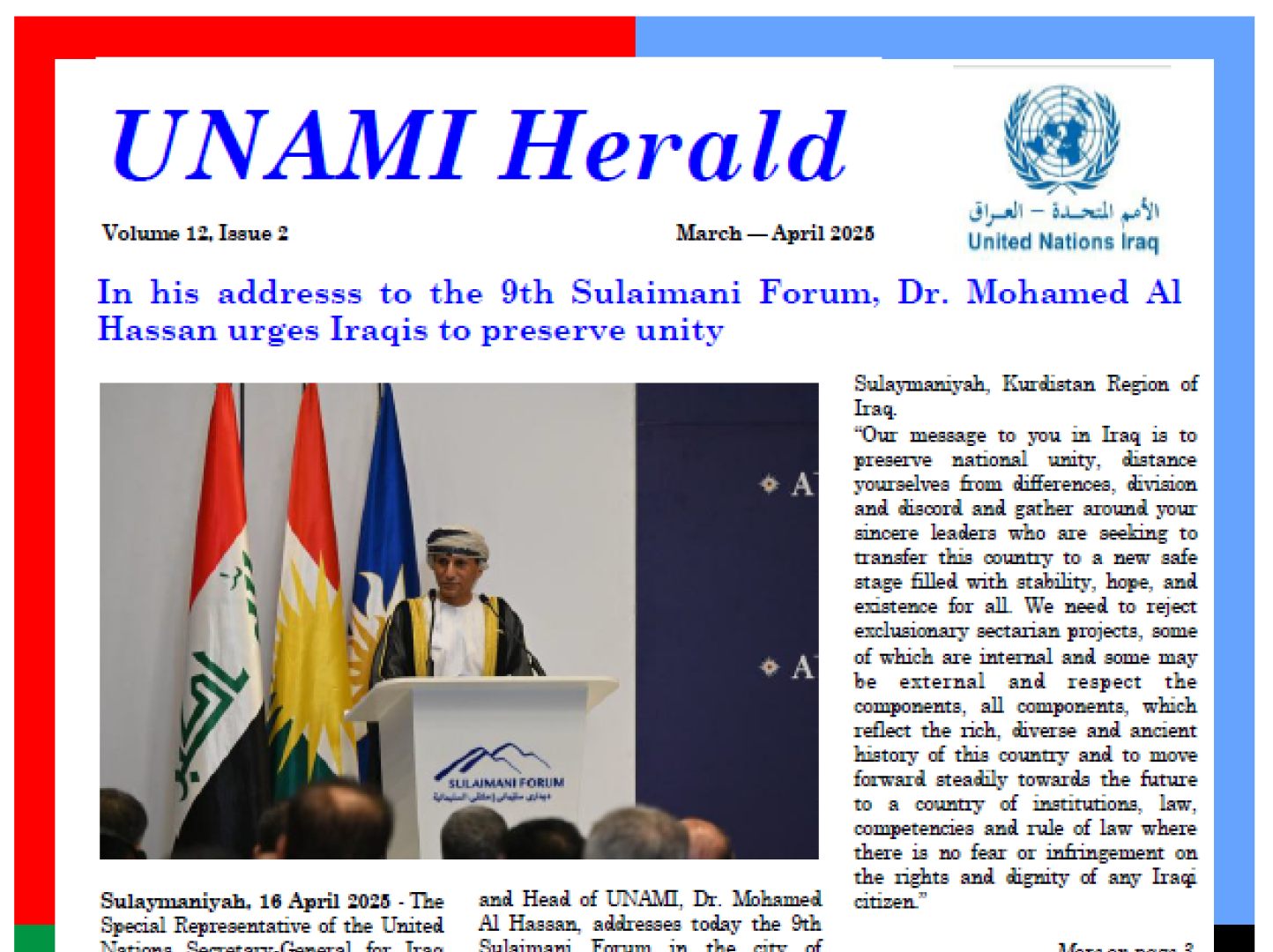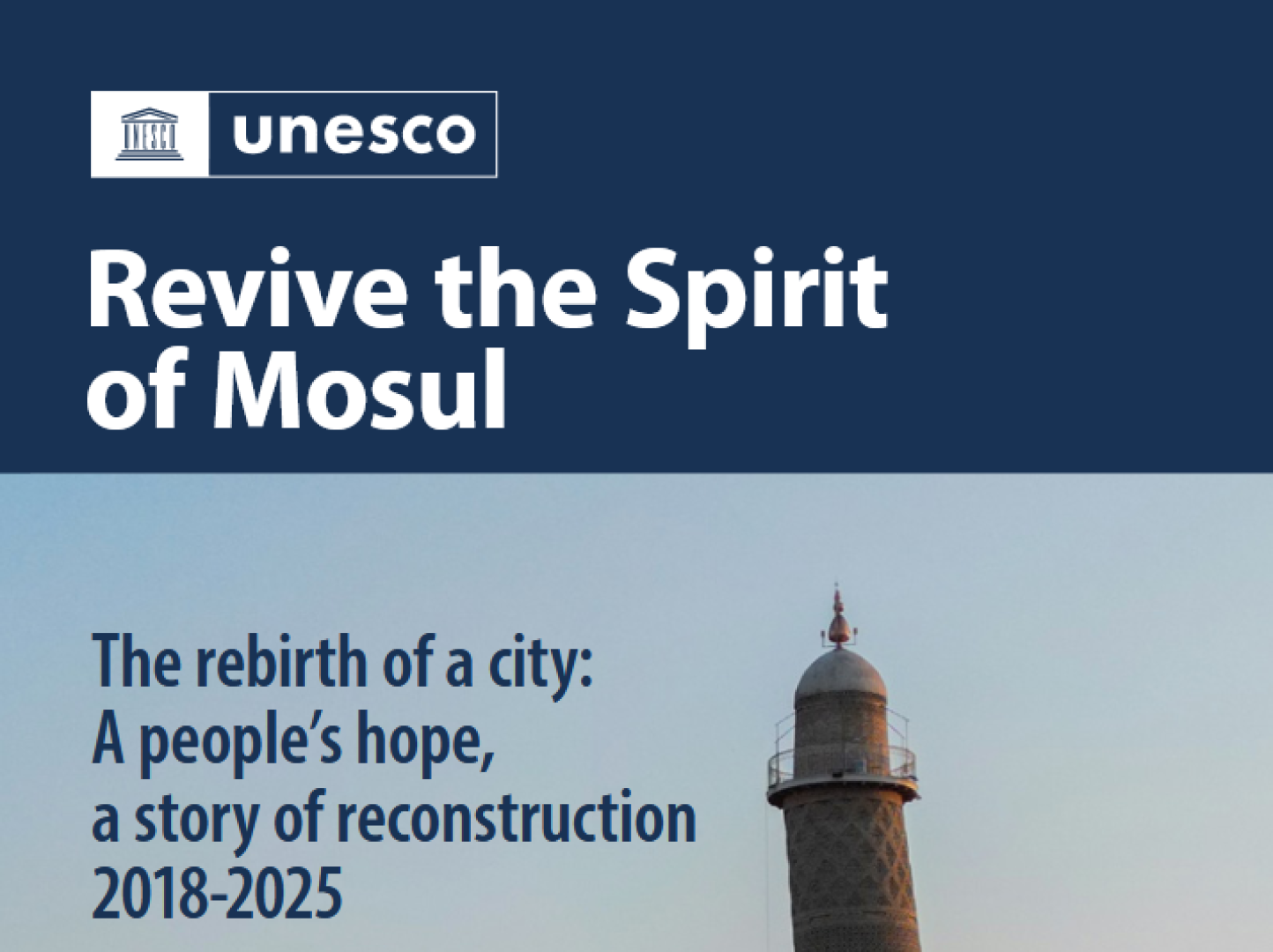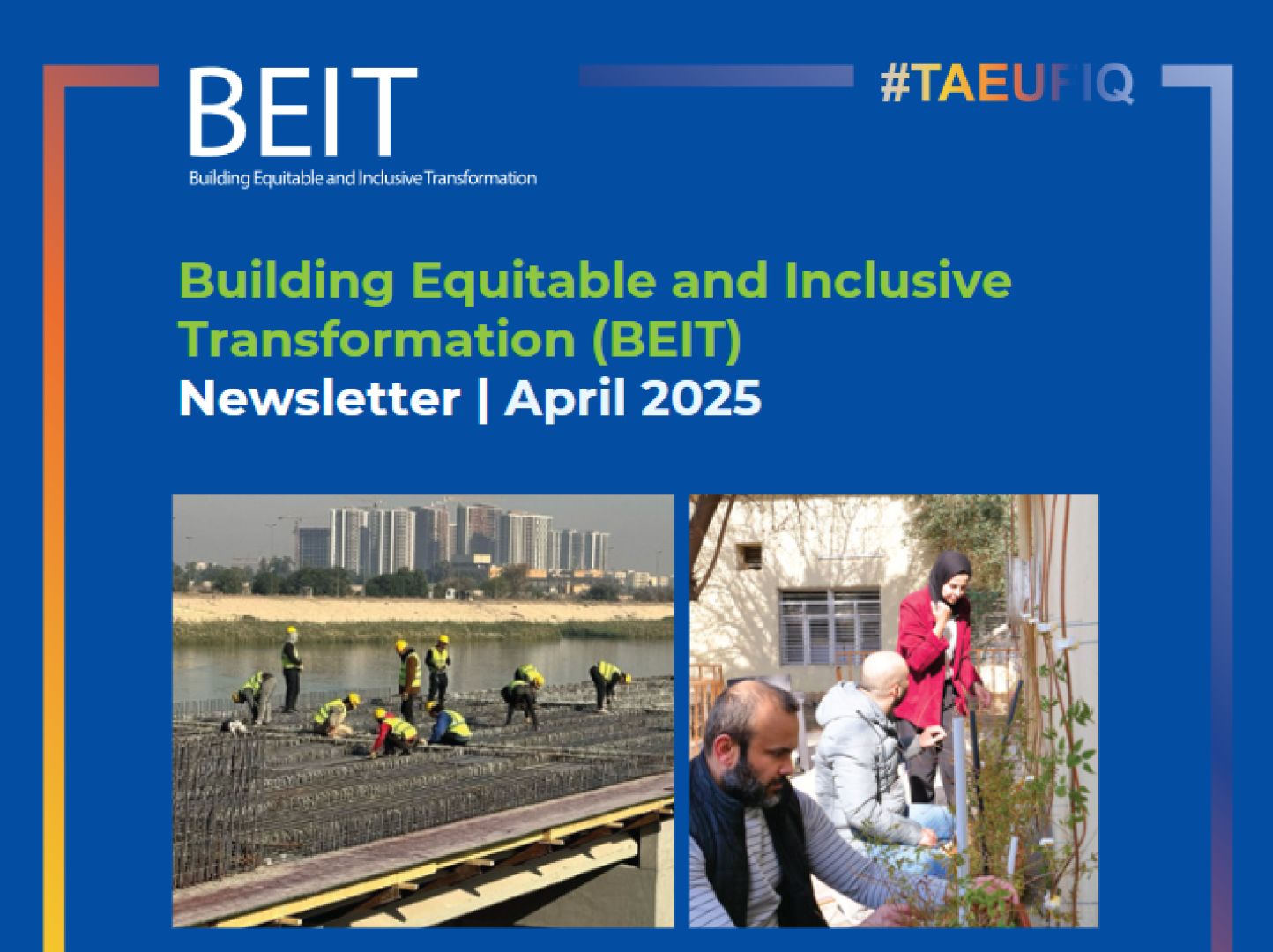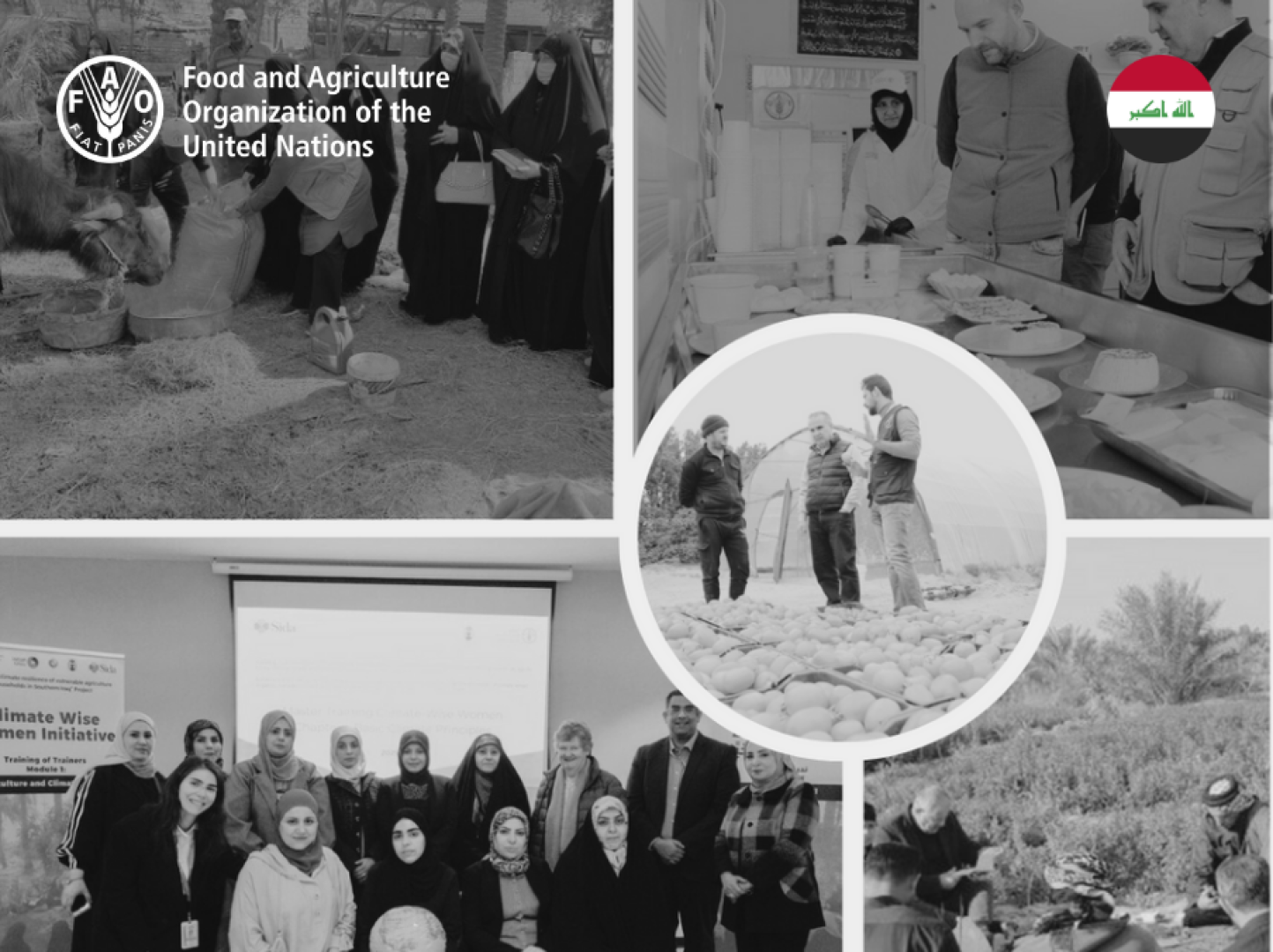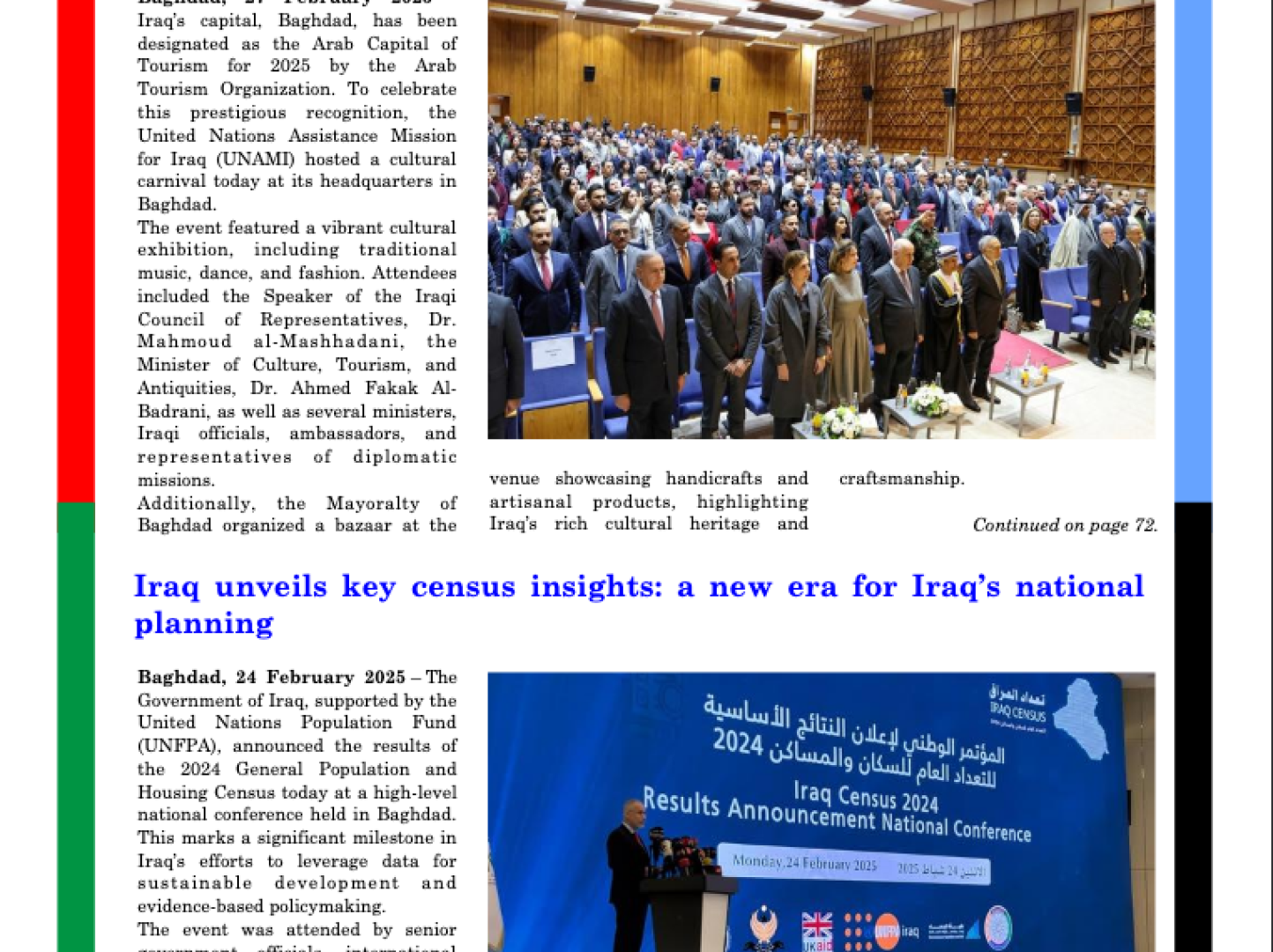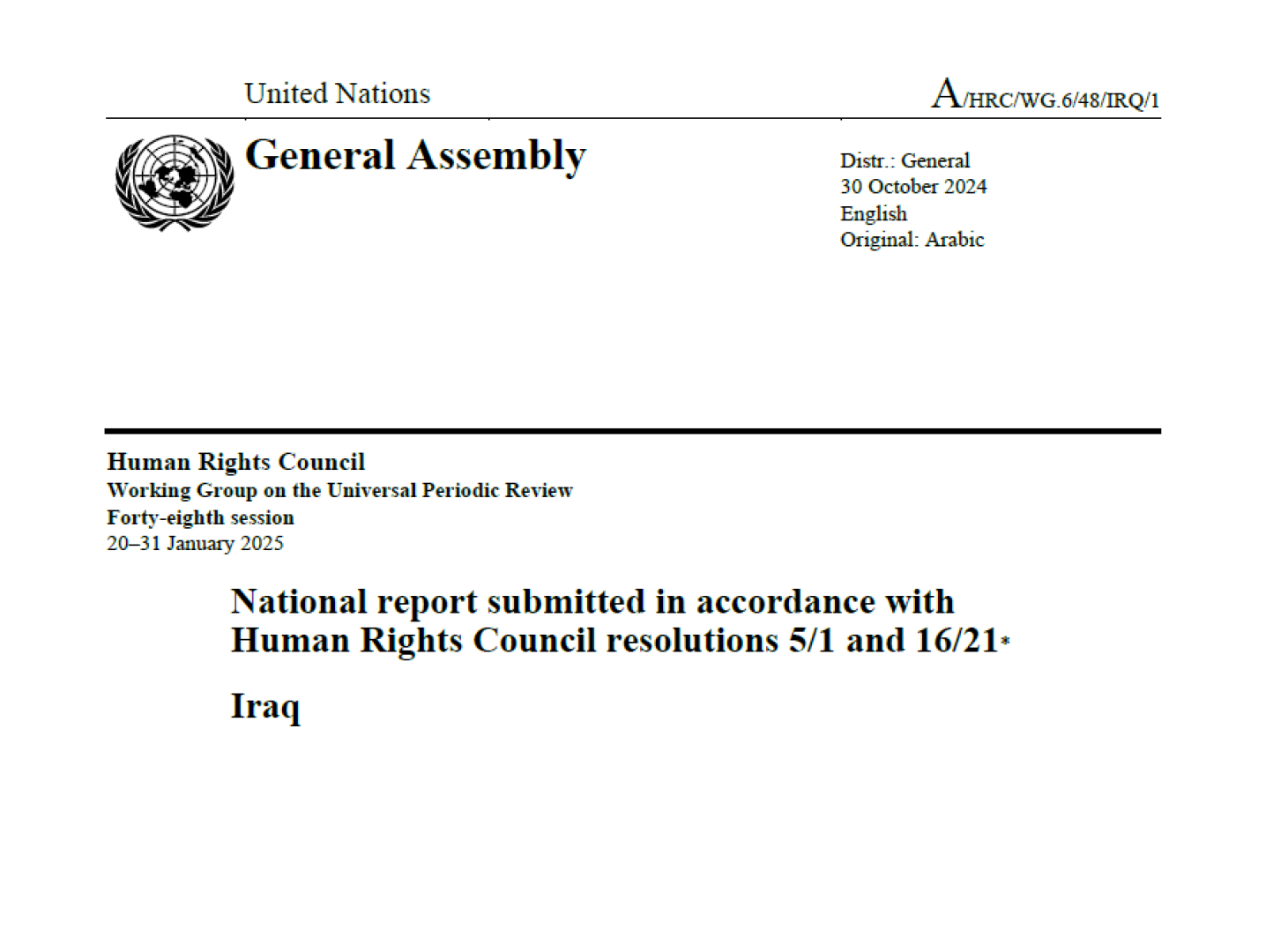Latest
Speech
10 July 2025
UN Secretary-General message for World Population Day
Learn more
Press Release
09 July 2025
First Gene/Seed Bank in Kurdistan Region to Preserve Iraq's Agricultural Heritage
Learn more
Press Release
07 July 2025
Emphasis on free, fair and transparent elections as UNAMI and IHEC discuss electoral preparations
Learn more
Latest
The Sustainable Development Goals in Iraq
The Sustainable Development Goals are a global call to action to end poverty, protect the earth’s environment and climate, and ensure that people everywhere can enjoy peace and prosperity. These are the goals the UN is working on in Iraq:
Publication
10 July 2024
United Nations in Iraq | Annual Results Report 2023
The United Nations Country Team (UNCT) in Iraq, composed of 23 UN Agencies, Funds and Specialized Programmes, is dedicated to supporting Iraq’s journey towards achieving the Sustainable Development Goals (SDGs). Guided by the principle of Leaving No One Behind, the UNCT, under the leadership of the Deputy Special Representative of the UN Secretary-General and Resident and Humanitarian Coordinator, employs evidence-based actions and specialized expertise to enhance the lives and livelihoods of all Iraqis, with a particular focus on the most vulnerable and marginalized communities.
The operational blueprint of the UNCT is encapsulated in the United Nations Sustainable Development Cooperation Framework (UNSDCF) 2020–2024, which lays out the shared development objectives of the UN in Iraq. This framework is pivotal, outlining five strategic priorities ranging from achieving social cohesion, protection and inclusion to promoting natural resource management and climate change resilience. The overall aim is to achieve inclusive and sustainable economic growth and efficient institutional services.
Integrating the humanitarian, development and peace nexus within its collective work, the UNCT is aligned with Iraq’s Vision 2030, the Kurdistan Regional Government’s Vision for the Future and the National Development Plan, among other strategic documents. This synergy ensures that the UN’s efforts are harmonized with national priorities and strategies, marking a transition from humanitarian assistance to sustainable development and peacebuilding, firmly rooted in the commitment to leave no one behind.
The operational blueprint of the UNCT is encapsulated in the United Nations Sustainable Development Cooperation Framework (UNSDCF) 2020–2024, which lays out the shared development objectives of the UN in Iraq. This framework is pivotal, outlining five strategic priorities ranging from achieving social cohesion, protection and inclusion to promoting natural resource management and climate change resilience. The overall aim is to achieve inclusive and sustainable economic growth and efficient institutional services.
Integrating the humanitarian, development and peace nexus within its collective work, the UNCT is aligned with Iraq’s Vision 2030, the Kurdistan Regional Government’s Vision for the Future and the National Development Plan, among other strategic documents. This synergy ensures that the UN’s efforts are harmonized with national priorities and strategies, marking a transition from humanitarian assistance to sustainable development and peacebuilding, firmly rooted in the commitment to leave no one behind.
1 of 5
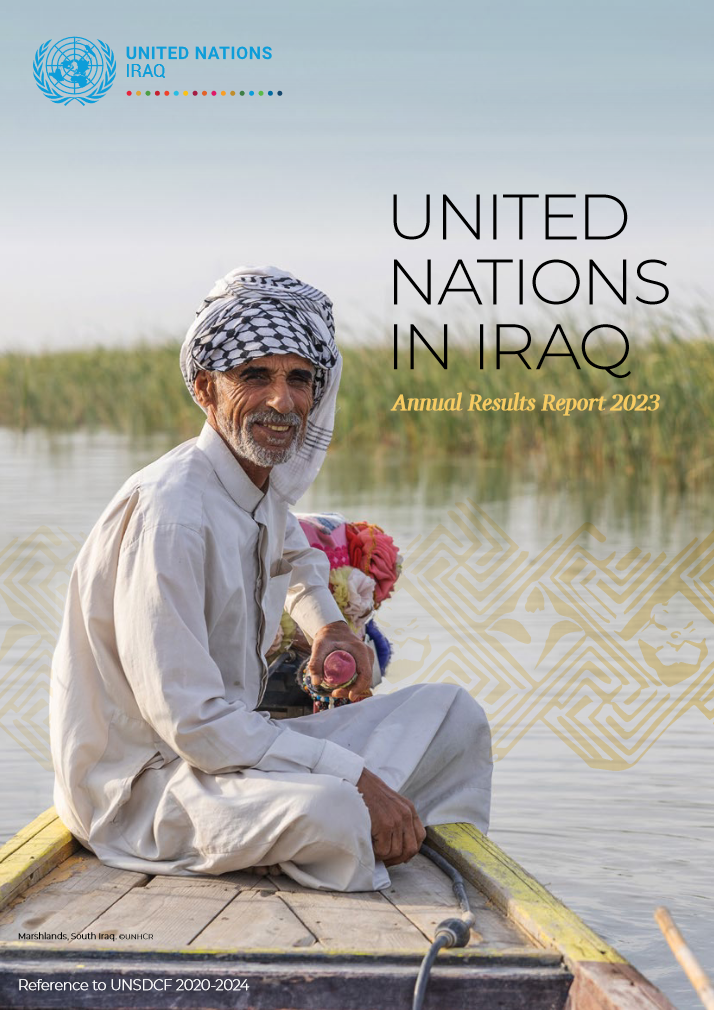
Story
17 October 2024
Message from SRSG Dr. Mohamed Al Hassan on the Kurdistan Regional Parliamentary Elections
Where the people of this Region will be going to the polls on Friday and Sunday to exercise their right to elect their representatives in the new regional parliament.It is a political representation of the people of the Kurdistan Region of Iraq for the coming four years.It will reinvigorate democracy and inject new ideas into its institutions that will address the people’s concerns.This is all too necessary. The Kurdistan Region has been without a parliament for some times. This election is long overdue.Elections are an important milestone in the Region’s journey. I visited the Kurdistan Region for the first time after assuming my position as Special Representative of the Secretary-General of the United Nations for Iraq and Head of UNAMI.The Kurdistan Region today is a different region from what it was decades ago.I was very impressed by the development and the progress that I have witnessed so far.I am certain many challenges might remain.However, Kurdistan is on the right path towards a better future.Now it is the opportunity to mark that path. The election campaign concluded this week. Rallies by political parties and candidates were overall peaceful. This is a true spirit of a democratic process.We encourage the nearly 3 million eligible voters in this part of Iraq, namely in Erbil, Sulaymaniyah, Dohuk and Halabja to go out and vote.We cannot reiterate enough the importance of exercising this right, which so many fellow Kurds have paid the heavy price to ensure it is safeguarded for generations to come.We would like to thank the Independent High Electoral Commission for all the preparatory work to make this election a free, fair and transparent one.UNAMI is supporting IHEC through its electoral team’s technical expertise and advice.IHEC has put in place measures and mechanisms to address complaints and any potential problem.International and local partners are also participating in the observation process for the elections.And we look forward to successful Election Days on the 18th and 20th October. Make your voices heard and your opinions count. Vote!Thank you very much.
1 of 5
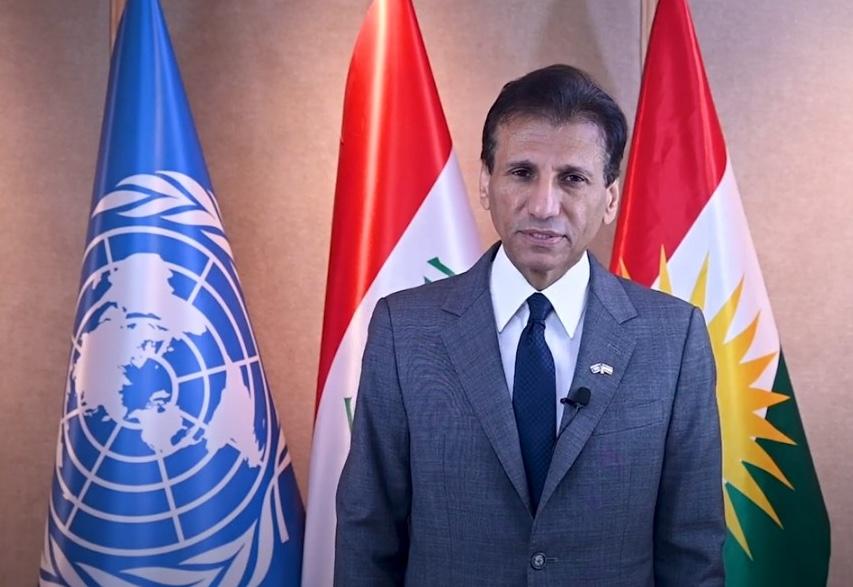
Story
28 January 2025
Remarks of the Special Representative of the Secretary-General and Head of UNAMI
Remarks of the Special Representative of the Secretary-General and Head of the United Nations Assistance Mission for Iraq (UNAMI) Dr. Mohamed Al Hassan, during Iraq Energy Conference – Baghdad, 28 January 2025
1 of 5
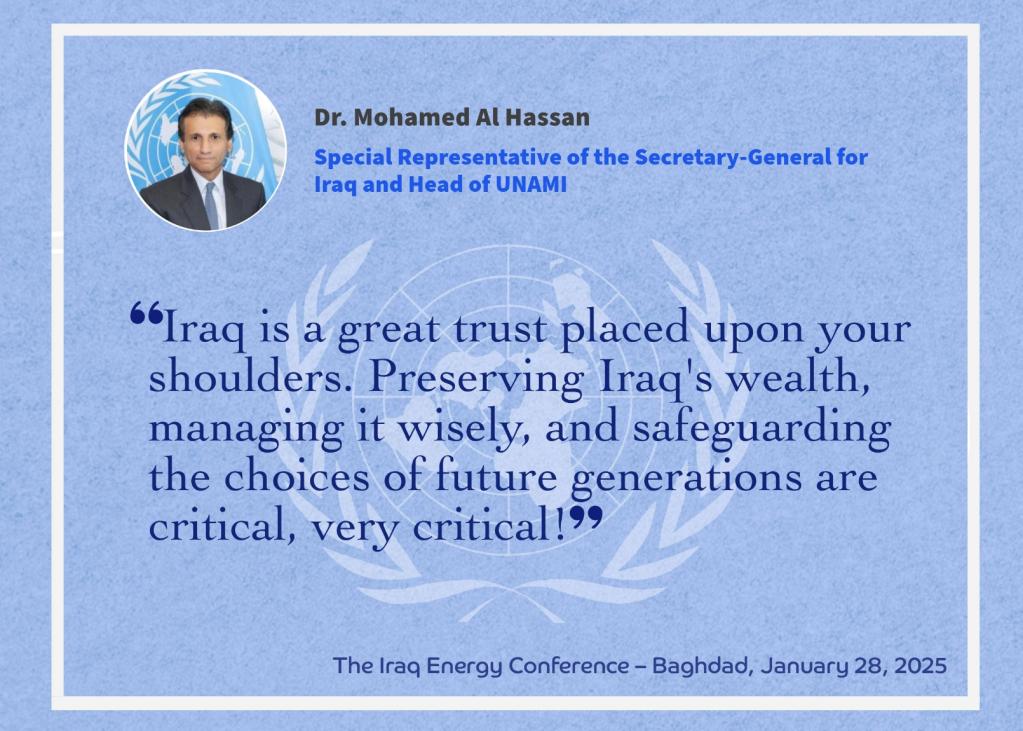
Story
12 December 2023
UN Special Representative for Iraq attends Election Day simulation
The Special Representative of the Secretary-General and Head of the United Nations Assistance Mission for Iraq (UNAMI), Ms. Jeanine Hennis-Plasschaert, attended today a simulation of Election Day processes that was held by Iraq’s Independent High Electoral Commission (IHEC).
The simulation included a comprehensive demonstration of all electronic devices to be used on Election Day, such as voter verification devices, polling station count optical scanners, results transmission devices, and cameras. This simulation was conducted successfully, showcasing the technical readiness of IHEC for the Governorate Council elections, scheduled for 18 December 2023.
In accordance with its 2023 mandate, UNAMI advises and assists the work of IHEC. UNAMI will not observe or monitor the 18 December elections, and is therefore not in a position to undertake an assessment of the manner in which the elections are conducted.
1 of 5
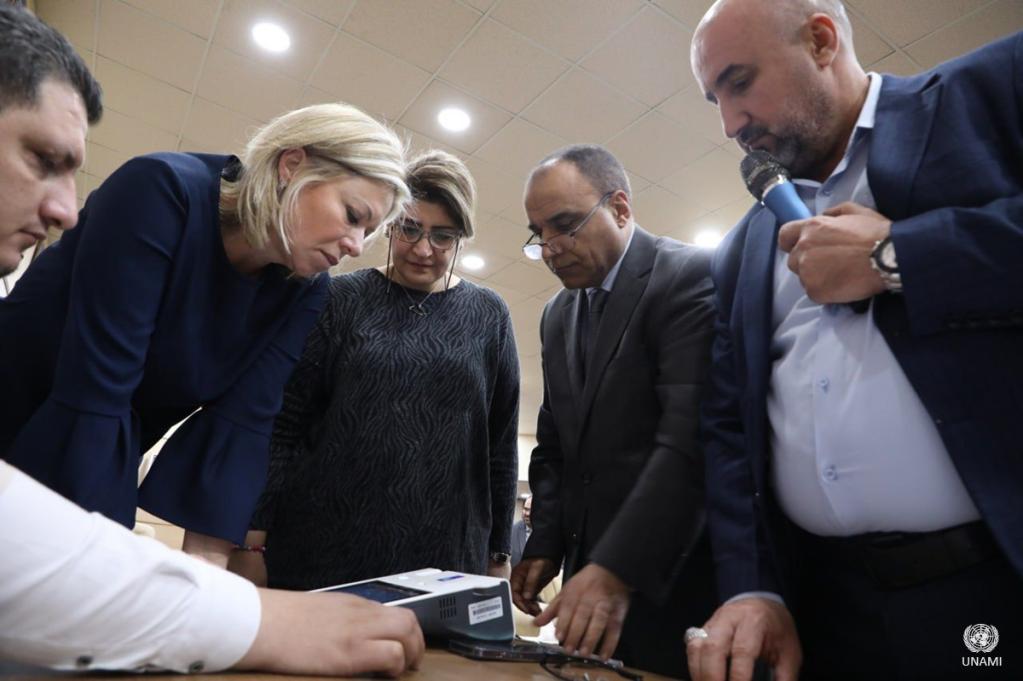
Story
20 November 2024
UN Iraq Special Representative commends population census in Iraq
The Special Representative of the United Nations Secretary-General for Iraq and Head of the United Nations Assistance Mission for Iraq (UNAMI), Dr. Mohamed Al Hassan, commended today the conduct of the first population census in Iraq in 37 years, stressing its importance for future development plans and projects in the country.This came during a visit with His Excellency Prime Minister Mohammed Shia Al-Sudani to the Operations Center for the Population Census at the Ministry of Planning, where the Prime Minister and the SRSG were briefed in detail about the process today and tomorrow as well as the methods of data collection and updates. Present at the briefing was the Deputy Prime Minister and Minister of Planning, Dr. Mohammed Tamim.Dr. Al Hassan lauded the conduct of the process and the huge government efforts to make it a success. "This is a historic phase for Iraq. What we have witnessed today are important steps for the future of Iraq. This census is aimed towards development. The progress of states depends primarily on census. The professionalism we have seen today confirms confidence in the process and the seriousness in its implementation, with UNFPA’s technical cooperation."Dr. Al Hassan appreciated the efforts of staff working on the ground and UNFPA’s advice and technical assistance to make the process a success. He urged everyone to participate and cooperate for the benefit of Iraq and its people.“This census is to ensure rights, access to public services, the equitable distribution of resources among different regions, and planning based on scientific and modern criteria. On my behalf and on behalf of the United Nations, we congratulate you and wish you success for a better Iraq.”
1 of 5
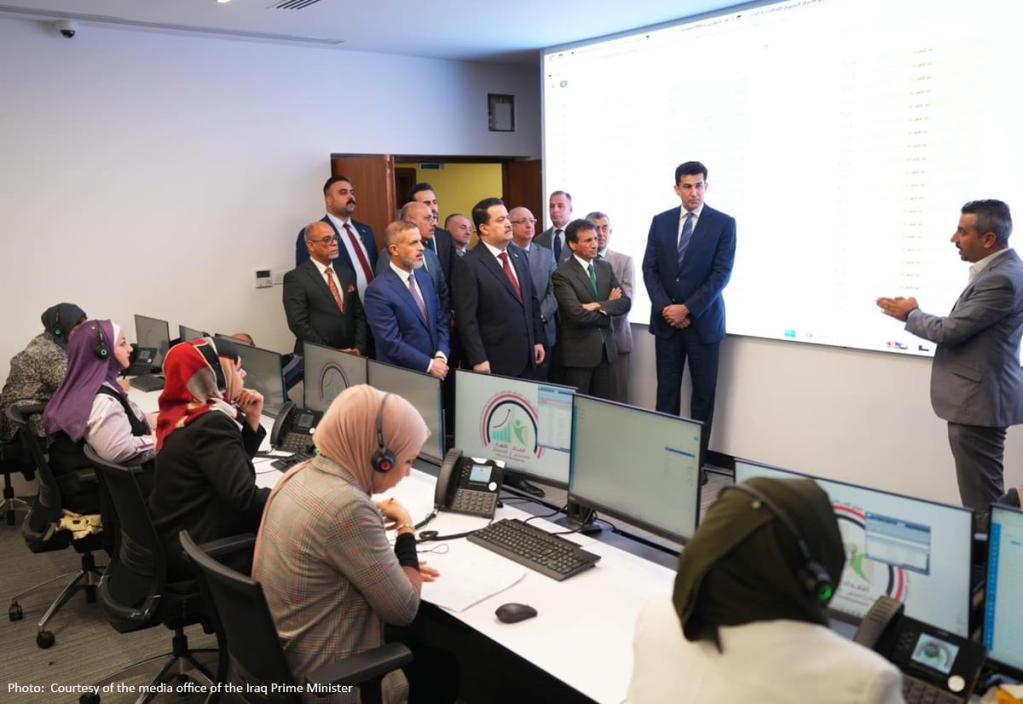
Story
06 July 2025
Statement to the press by the SRSG and Head of UNAMI, Dr. Mohamed Al Hassan, Karbala Governorate, 5 July 2025
But you have always been generous with us in the media sector — partners in delivering this message. Our thanks are a small thing.Today, I’m on a scheduled visit — honestly, one that has been planned for quite some time — to the Holy Governorate of Karbala, on this day, the ninth of Muharram. And as you are used to in our visits to any Iraqi governorate, the programme always starts by entering through the proper doors — through the gate of the Governor — and that’s what we did. This is the usual practice we follow.I met with my brother and colleague, the Governor, in the presence of a number of deputies and representatives in this developing governorate. We discussed ways to strengthen cooperation between the United Nations and Karbala Governorate in the field of sustainable development across different sectors. I also listened to his vision regarding improving services for the people of this part of Iraq, and the plans he is proposing in coordination with the government in Baghdad to develop many sectors — especially future sectors related to artificial intelligence and digital technology, where this governorate is already ahead.We also touched on some areas of cooperation with the United Nations. There are many joint programmes, and God willing, they will continue and move forward. Karbala deserves that.Also today, a short while ago, I met with the representative of the Supreme Religious Authority here, His Eminence Sheikh Abdul-Mahdi Al-Karbalai — may God protect him. During the meeting, we emphasized the historic role the religious authority plays in strengthening national harmony, protecting Iraq’s social fabric, and promoting a culture of tolerance and coexistence.My message to our people in Iraq — including in this holy governorate — is: what I saw today in Karbala is a living image of Iraq’s unity and solidarity. What we witnessed truly reflects the meaning of national belonging above all other considerations. The stability achieved in Iraq did not come by coincidence — it is the result of collective will and costly sacrifices. We hope for Iraq the utmost success, safety, stability, and prosperity, inspired by the spirit of Karbala that rises above oppression.Field visits have always been an opportunity to capture the pulse of the genuine Iraqi street. And choosing this specific time — during the sacred days of Muharram — is a clear sign of our respect for the sanctity of the Iraqi people’s feelings, and our belief that the eternal message of truth is the foundation for any real peace.Thank you.
1 of 5
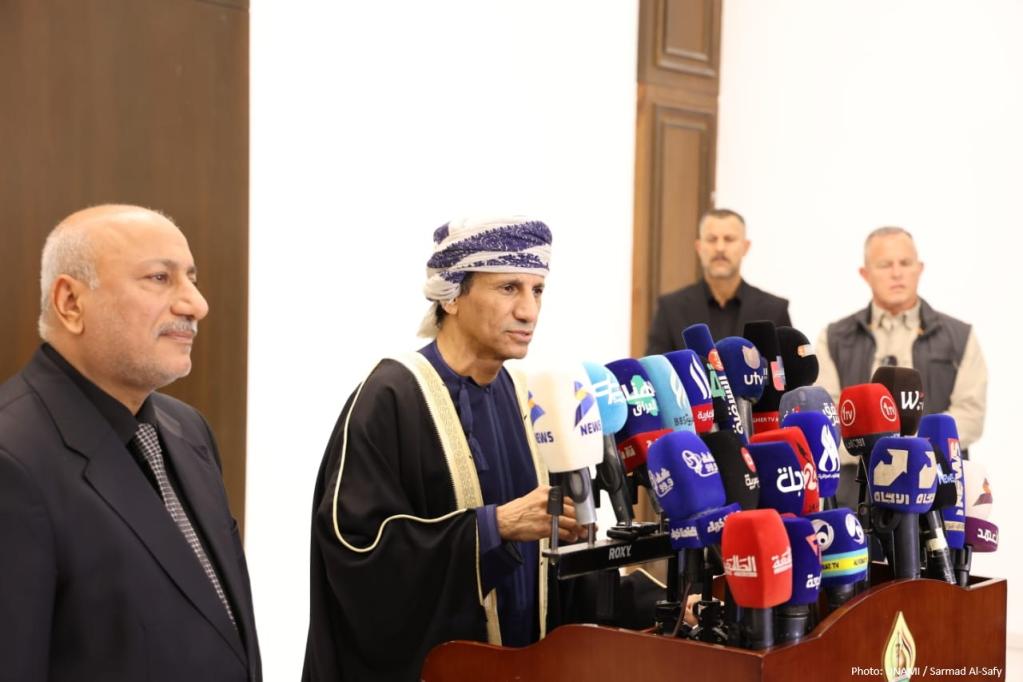
Story
06 July 2025
Cooperatives of Hope: Inside Nineveh’s Dairy Revival
The "Support to Agricultural Livelihoods of Rural and Peri-Urban Returnees and Communities in Nineveh Governorate, Iraq" project was implemented under the FAO’s initiative, in cooperation with the Ministry of Agriculture (MoA) and funded by the European Union (EU). This project aimed to rebuild agricultural livelihoods in Nineveh by supporting rural and peri-urban returnees, helping them restore their farms and create sustainable income sources. Through this initiative, farmers have come together, organized, and found new strength in cooperation.One of these farmers is Intissar Jamil (Om Mustaha), from Qaraqosh-Al Hamdania. She shares with us her journey of resilience and transformation, and how her life has changed through the cooperative movement."My name is Intissar Jamil (Om Mustaha), and I’m one of more than one hundred farmers—men and women—who have come together to form three cooperatives in Nineveh: Ashur, Um Al-Rabeein, and Al-Hadbaa. Together, we are rebuilding what conflict and displacement tried to destroy: our farms, our livelihoods, and our sense of community."Our journey started long before the official registration of our cooperatives in 2023. We were working in isolation—growing fodder here, producing milk there—but without coordination or structure. Every household was on its own, and every season was a struggle. Water was scarce, inputs expensive, and markets unpredictable.Then something shifted. We realized that we’re stronger when we work together. So, we organized. We got trained. We got legal recognition. And most importantly, we started trusting each other again.Today, each of our cooperatives has more than 40 members with official ID cards and shared responsibilities. We grow our own green fodder, raise our livestock using improved practices, and collect and process the milk ourselves. We make dairy products like cheese, yogurt, and ghee, and sell them in nearby villages and markets.When I walk into our collection center each morning, I no longer feel like just a small-scale farmer—I feel like a businesswoman, a community member, and a provider.This isn’t just about money. Yes, our incomes have improved—many of us now make regular sales, and we’re investing back into our farms. But the real transformation is what you can’t see in numbers. Women like me now have a seat at the table. We speak, we vote, we lead. Young people are staying in the village, choosing to work the land rather than leave. Neighbors who barely spoke before now run businesses together. We’ve created something powerful—a local solution to local problems.Farming in Nineveh isn’t easy. We face water shortages, degraded soil, and a fragile economy. But these cooperatives have given us tools—and more importantly, confidence. When we face a bad season, we face it together. When someone falls behind, the group steps in. Our strength isn’t just in our products—it’s in our solidarity. We are not victims. We are survivors, entrepreneurs, and innovators. We may live far from the cities, but we are at the heart of Iraq’s food system. And we’re proving that with a little structure, some knowledge, and a lot of trust, rural communities can not only recover—they can thrive.If you ever visit Nineveh, come see us. Taste our cheese, walk through our fields, and meet the people who refused to give up.We’re not just producing milk—we’re producing hope.
1 of 5
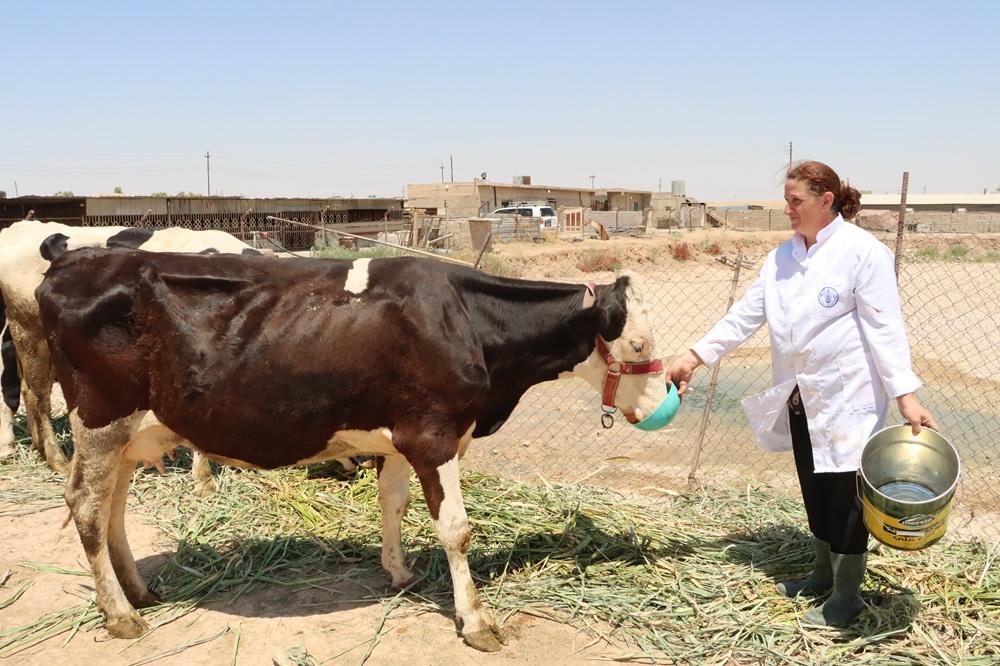
Story
06 July 2025
UN Special Representative for Iraq and Head of UNAMI, Dr. Mohamed Al Hassan, visits Karbala Governorate
Karbala, 5 July 2025 – The Special Representative of the United Nations Secretary-General for Iraq and Head of the United Nations Assistance Mission for Iraq (UNAMI), Dr. Mohamed Al Hassan, conducted a visit today to Karbala Governorate, which included a meeting with H.E. the Governor, Mr. Nsayif Jassim Al-Khatabi.During the meeting with the Governor of Karbala, discussions focused on several matters, including topics of development in the governorate and the potential contribution of the United Nations through its specialized agencies. The Special Representative commended the progress achieved in the governorate and its importance at the national level.In a press conference, the Special Representative expressed the United Nations’ interest in supporting development and service improvement throughout Iraq, including in the promising governorate of Karbala. He emphasized the importance of continued cooperation between the Government of Iraq and the United Nations.The Special Representative also expressed his confidence in Iraq’s ability to advance to new stages of development, noting the human and scientific potential of Iraq’s people both inside and outside the country. Full text of the Special Representative’s remarks available at: https://youtu.be/__fpGS1fLsg
1 of 5
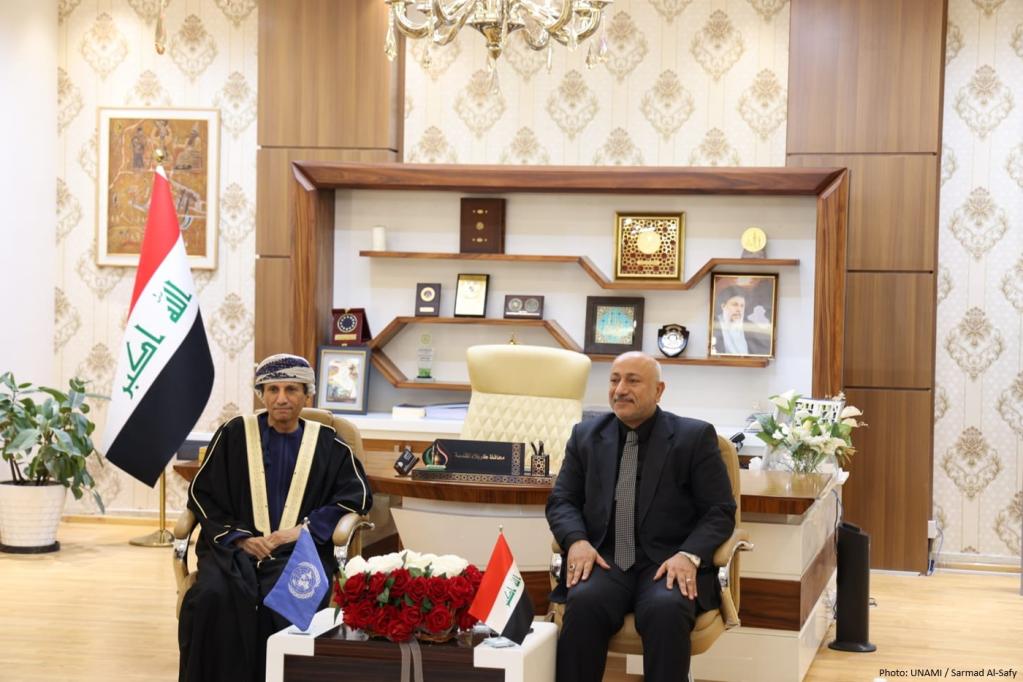
Story
06 July 2025
UN SRSG meets with representative of the Supreme Religious Authority
Karbala, 5 July 2025 – As part of his visit to Karbala, the Special Representative of the United Nations Secretary-General for Iraq and Head of UNAMI, Dr. Mohamed Al Hassan, met today with the representative of the Supreme Religious Authority in the city, His Eminence Sheikh Abdul-Mahdi Al-Karbalai.The meeting included a discussion on the situation in Iraq and a number of issues of mutual interest, with emphasis on the historical role played by the religious authority in fostering national harmony, safeguarding Iraq’s social fabric, and promoting a culture of peace and tolerance among the Iraqi people in all their diversity.The UN Representative was also briefed on a number of humanitarian and charitable projects implemented by the religious authority to serve the people of Karbala Governorate across several sectors, including education, healthcare, and social services. The Special Representative commended these projects and community-based initiatives, noting their tangible impact on the lives and well-being of the governorate’s residents.
1 of 5
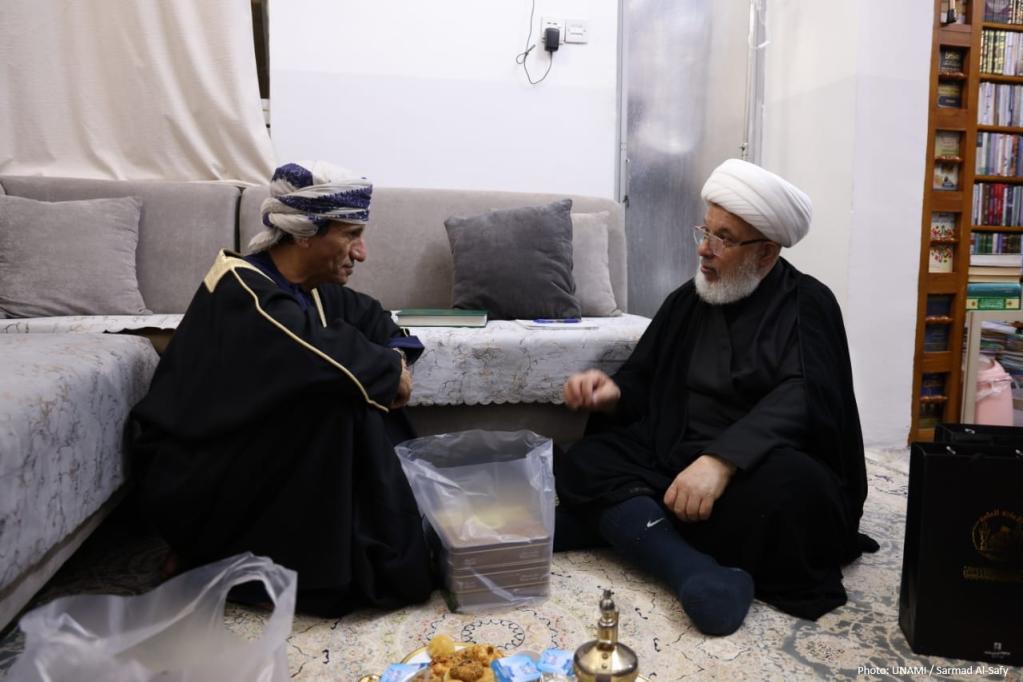
Story
01 July 2025
Promoting Human Rights in Iraq’s Counter-Terrorism Efforts: UNOCT and NSA Host a Workshop for Security Entities in Diyala Governorate
Erbil, Iraq – 2-3 June 2025The United Nations Office of Counter-Terrorism’s (UNOCT) Human Rights Unit, in collaboration with Iraq’s National Security Advisory (NSA), concluded a two-day workshop in Erbil on “Human Rights-Compliant Investigation Techniques in the Context of Counter-Terrorism for the Iraqi Law Enforcement and Intelligence Services in Diyala Governorate.”As part of the UNOCT project “Human Rights and Counter-Terrorism: Capacity-building Support to Law Enforcement and Intelligence Services in Iraq,” the workshop aimed to strengthen the capacity of Iraqi counter-terrorism professionals working in the Diyala governorate to conduct investigations that respect international human rights. The initiative is generously funded by the Government of Canada.Participants included members of the Supreme Judicial Council (SJC), officers from Diyala Governorate’s law enforcement and intelligence agencies, and representatives of the Iraqi High Commission for Human Rights (IHCHR), in addition to the presence of one CSO from Diyala. Through interactive sessions, practical exercises, and expert-led discussions, the workshop addressed psychological approaches to investigations, interview techniques, stress management, and the legal boundaries of interrogation.Key objectives of the training included:Strengthening the capacity of participants to conduct human rights-compliant investigations in terrorism cases;Introducing principles of investigative psychology;Exploring the legal and ethical challenges facing investigators;Enhancing collaboration among investigative security agencies, judicial institutions, and human rights monitors.This marks the tenth workshop under the ongoing capacity-building initiative led by UNOCT and NSA, reinforcing Iraq’s efforts to ensure justice and accountability in counter-terrorism operations while upholding human rights principles.Ms. Shurooq Fakhir / Assistant Secretary of the National Counter-Terrorism Committee - NSA: “We value our partnership with UNOCT and the Government of Canada in building the capacities of law enforcement and intelligence agencies in the HR field.”The event built the capacity of Iraqi law enforcement and intelligence officers from Diyala Governorate to comply with international HR in their CT work.Participants included 32 officers from NSA, the Supreme Judicial Council (SJC), the Iraqi High Commission for Human Rights (IHCHR), and security officers involved in investigating CT cases in Diyala Governorate. These participants have experience in handling terrorism-related cases.Participants engaged in interactive sessions covering the legal foundations of human rights in investigations and the role of investigative psychology. Practical exercises focused on human rights and the Iraqi legal framework.
1 of 5
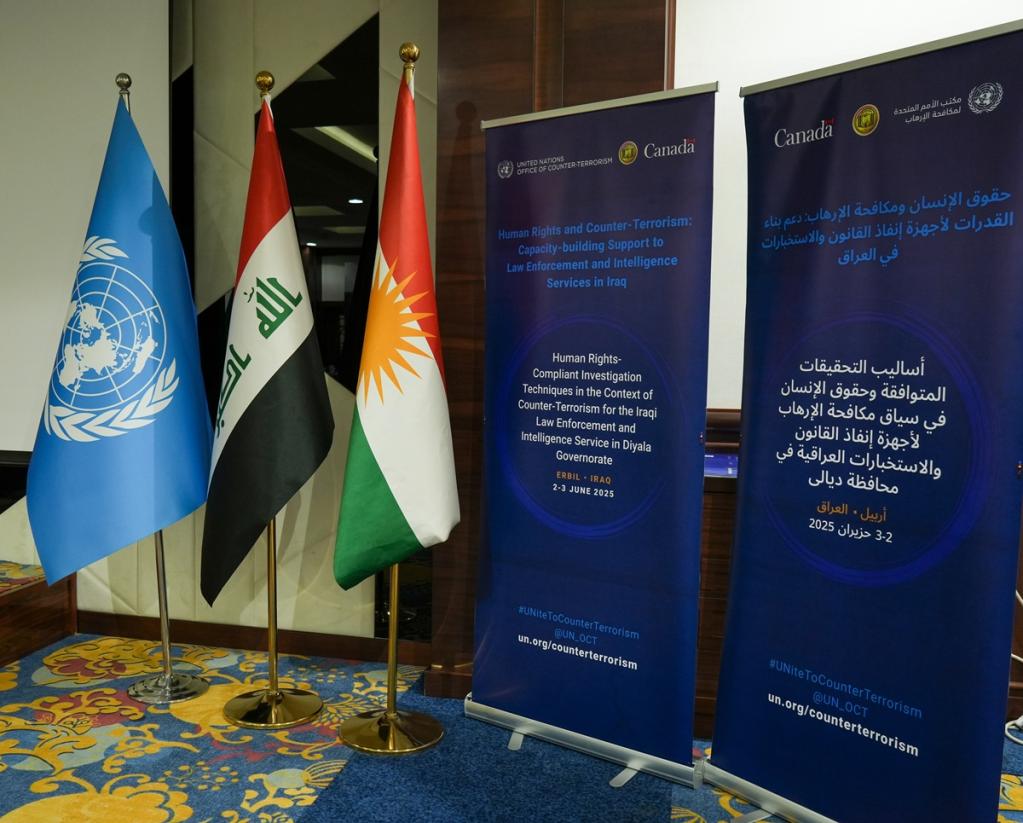
Press Release
09 July 2025
First Gene/Seed Bank in Kurdistan Region to Preserve Iraq's Agricultural Heritage
The event was inaugurated by H.E. Deputy Prime Minister of the Kurdistan Regional Government, Mr. Qubad Talabani; H.E. Minister of Agriculture and Water Resources, Ms. Begard Talabani; the Governor of Sulaymaniyah, Dr. Haval Abubakir; the Mayor of Sulaymaniyah, Ms. Leyla Omar Ali; the FAO Representative in Iraq, Mr. Salah El Hajj Hassan; along with a number of senior representatives from academic and agricultural institutions.H.E. Mr Qubad Talabani, Deputy Prime Minister, emphasised the importance of this initiative, saying: ‘The gene bank is an investment for the future; it protects our past and secures our future.’The Gene/Seed bank is a strategic facility for conserving Iraq’s rich plant genetic diversity, which includes over 3,500 plant species originating from the ancient civilizations that once flourished in Iraq—the cradle of civilization. These species hold scientific, historical, and human value across the region and globally. The facility will enable the conservation of rare plant genetic resources, including wild varieties of grains, vegetables, and indigenous crops. It will also strengthen Iraq’s capacity to conserve seeds and make use of valuable genetic traits—such as drought tolerance—from wild species to support the development of more climate-resilient crops.In her remarks, H.E. Minister Begard Talabani stated: “This initiative represents a strategic milestone in the journey of developing the agricultural sector by protecting plant diversity and supporting scientific research. It will enable farmers to benefit from our historical plant heritage and will allow us to preserve our agricultural legacy for future generations.”FAO Representative in Iraq, Mr. Salah El Hajj Hassan, expressed his sincere appreciation to FAO’s national partners in the federal government and the Kurdistan Regional Government for their close collaboration and support. He also acknowledged and thanked the European Union for funding this initiative under the scope of the “Restoration and Strengthening the Resilience of Agri-Food Systems in Iraq,” project, which also reflects the follow-up to the recommendations resulting from the FAO Director-General visit to Iraq and his meetings with senior officials. He added that this facility represents a center for scientific innovation in research and resilience-building. It enables the preservation of Iraq’s historical, environmental and agricultural heritage, ensures that future generations can benefit from it, and stands as a testament to FAO’s commitment to transforming Iraq’s agricultural legacy into a powerful tool for sustainable development.”The gene bank will house modern storage vaults, laboratories, research and training facilities, and seed data documentation and conservation areas. Future expansion is anticipated to include a field gene bank, a tissue culture laboratory, and a cryobank.The initiative directly contributes to the Sustainable Development Goals (SDGs), particularly SDG 2: Zero Hunger and SDG 13: Climate Action, by investing in biodiversity conservation and climate-resilient agriculture.
1 of 5
Press Release
07 July 2025
Emphasis on free, fair and transparent elections as UNAMI and IHEC discuss electoral preparations
The Special Representative of the United Nations Secretary-General for Iraq and Head of UNAMI, Dr. Mohamed Al Hassan, welcomed the IHEC Chair and the Board of Commissioners, underlining the Commission’s central role in ensuring an Iraqi-led and Iraqi-owned process that is free, fair and transparent.The Special Representative stressed that maintaining the independence of the Commission and bolstering the trust of Iraqis are key to successful elections, emphasizing the significance of this CoR elections in consolidating Iraq’s stability and strengthening its democratic institutions and mechanisms of good governance. In this context, he called on political parties to commit to a code of conduct that promotes peaceful, orderly, well-managed and credible elections, and to refrain from the use of money for political purposes, to ensure the integrity, independence, and transparency of the elections. He further stressed that the process must be inclusive and serve all Iraqis, regardless of sectarian, ethnic, or religious affiliation, while emphasizing the importance of the participation of women and minorities.
1 of 5
Press Release
06 July 2025
UN Special Representative for Iraq and Head of UNAMI, Dr. Mohamed Al Hassan, visits Karbala Governorate
During the meeting with the Governor of Karbala, discussions focused on several matters, including topics of development in the governorate and the potential contribution of the United Nations through its specialized agencies. The Special Representative commended the progress achieved in the governorate and its importance at the national level.In a press conference, the Special Representative expressed the United Nations’ interest in supporting development and service improvement throughout Iraq, including in the promising governorate of Karbala. He emphasized the importance of continued cooperation between the Government of Iraq and the United Nations. The Special Representative also expressed his confidence in Iraq’s ability to advance to new stages of development, noting the human and scientific potential of Iraq’s people both inside and outside the country.Full text of the Special Representative’s remarks available at: https://youtu.be/__fpGS1fLsg
1 of 5
Press Release
01 July 2025
United Nations in Iraq condemns attack in IDP camp in Duhok
The United Nations in Iraq calls for the protection of, and refraining from targeting, displacement camps - including the Darkar camp for Yazidi IDPs. It calls on the relevant authorities in Iraq to investigate the incident and to take the necessary and urgent measures to prevent the recurrence of such attacks, repair the damage, and to hold accountable those responsible for the attack, which is in clear violation of international law and human rights.
1 of 5
Press Release
25 June 2025
UN Secretary-General’s Special Representative Discusses Developments in Iraq and the Region with Iraqi Prime Minister
Today, His Excellency the Prime Minister of Iraq, Mr. Mohammed Shia al-Sudani, received the Special Representative of the United Nations Secretary-General for Iraq and Head of the United Nations Assistance Mission for Iraq (UNAMI), Dr. Mohamed Al Hassan. The meeting included discussions on the situation in Iraq and the wider region.The Special Representative conveyed to the Prime Minister the greetings of the United Nations Secretary-General, Mr. António Guterres, and his appreciation for Iraq’s responsible stance and its policy aimed at preventing the country from being drawn into regional conflicts. He also commended Iraq’s support for dialogue and diplomatic efforts as a way forward to peacefully resolve and settle ongoing disputes.The Special Representative stressed the importance of maintaining stability in Iraq and the region, praising the efforts made to restore security and stability and to build mutual trust based on the enduring principles and noble values enshrined in the Charter of the United Nations.During the meeting, the Prime Minister expressed his country’s deep appreciation for the role of the United Nations and its Secretary-General in defending truth, justice, and the noble values upon which the United Nations is founded.
1 of 5
Latest Resources
1 / 11
Resources
28 January 2025
1 / 11

